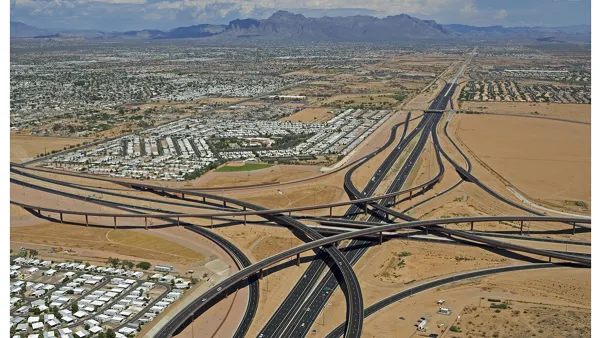At a Senate Environment and Public Works Committee meeting on Feb. 12, leaders from big labor, big business, AASHTO, and AMTRAK testified to the importance of keeping the Highway Trust Fund solvent. The first two specified increasing the gas tax.
"U.S. Chamber of Commerce President Tom Donohue told the Senate Environment and Public Works Committee that increasing the gas tax would be "the simplest, most straight-forward, and most effective way to generate enough revenue" to cover an estimated $20 billion per year shortfall in transportation funding," wrote Keith Laing, The Hill's veteran transportation reporter.
The Chamber leader received back up from an unlikely source on Wednesday from AFL-CIO President Richard Trumka, who told the panel, "The gas tax was last raised in 1993 when it represented 17 percent of the price of fuel; it now represents about five percent of the cost of fuel."
He agreed with Donohue in that boosting the federal gas tax, unchanged for two decades, was the way to go. Both agreed that a "user fee" approach made the most sense, as did committee chair, Sen. Barbara Boxer (D-Calif.), because of the "certainty" it provides.
Additional witnesses included Mike Hancock, president of the American Association of State Highway and Transportation Officials (AASHTO) who warned of "serious economic disruptions as early as this summer if USDOT delays reimbursements to the states for projects already completed." MAP-21, the current, two-year transportation bill expires on Sept. 31, 2014.
Hancock's testimony (PDF) suggested three options to deal with the impending insolvency of the Highway Trust Fund (HTF):
1. Provide additional General Fund transfers to the HTF in order to maintain the current level of highway and transit investment and meet prior-year obligations.
2. Provide additional receipts to the HTF by adjusting existing revenue mechanisms or implementing new sources of revenue.
3. Virtually eliminate new federal highway and transit obligations in FY 2015.
Finally, Amtrak CEO Joseph Boardman joined in. "We need a balanced Transportation Trust Fund that can provide investment in any surface mode-- including Highway, Transit, and Rail (both passenger and freight)," he said.
However, Laing notes that "Amtrak traditionally receives about $1 billion per year in funding from Congress, but the money is usually drawn from other places than the Highway Trust Fund."
FULL STORY: Business, labor groups push for gas tax hike

Planetizen Federal Action Tracker
A weekly monitor of how Trump’s orders and actions are impacting planners and planning in America.

Chicago’s Ghost Rails
Just beneath the surface of the modern city lie the remnants of its expansive early 20th-century streetcar system.

Amtrak Cutting Jobs, Funding to High-Speed Rail
The agency plans to cut 10 percent of its workforce and has confirmed it will not fund new high-speed rail projects.

Ohio Forces Data Centers to Prepay for Power
Utilities are calling on states to hold data center operators responsible for new energy demands to prevent leaving consumers on the hook for their bills.

MARTA CEO Steps Down Amid Citizenship Concerns
MARTA’s board announced Thursday that its chief, who is from Canada, is resigning due to questions about his immigration status.

Silicon Valley ‘Bike Superhighway’ Awarded $14M State Grant
A Caltrans grant brings the 10-mile Central Bikeway project connecting Santa Clara and East San Jose closer to fruition.
Urban Design for Planners 1: Software Tools
This six-course series explores essential urban design concepts using open source software and equips planners with the tools they need to participate fully in the urban design process.
Planning for Universal Design
Learn the tools for implementing Universal Design in planning regulations.
Caltrans
City of Fort Worth
Mpact (founded as Rail~Volution)
City of Camden Redevelopment Agency
City of Astoria
City of Portland
City of Laramie



























